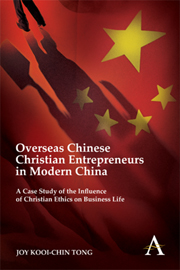 Overseas Chinese Christian Entrepreneurs in Modern China
Overseas Chinese Christian Entrepreneurs in Modern China Book contents
- Frontmatter
- Contents
- Acknowledgments
- List of Tables and Figures
- Chapter 1 Introduction: Studying Christian Ethics and Business Life in Post-1978 China
- Chapter 2 Religion and Economic Life: The Protestant Ethic and Max Weber's Legacy
- Chapter 3 Overseas Chinese Christian Entrepreneurs in Post-1978 China (Shanghai): Business, Faith and Ethics
- Chapter 4 Religious Motivation and Entrepreneurial Spirit
- Chapter 5 Business–Faith Integration: Three Types of Christian-Based Companies
- Chapter 6 Communities of Faith: Fellowships for Overseas Chinese Christian Businesspeople in Shanghai
- Chapter 7 Female Entrepreneurs: Four Stories
- Chapter 8 Conclusion and Research Implications
- Bibliography
- Index
Chapter 3 - Overseas Chinese Christian Entrepreneurs in Post-1978 China (Shanghai): Business, Faith and Ethics
Published online by Cambridge University Press: 05 May 2012
- Frontmatter
- Contents
- Acknowledgments
- List of Tables and Figures
- Chapter 1 Introduction: Studying Christian Ethics and Business Life in Post-1978 China
- Chapter 2 Religion and Economic Life: The Protestant Ethic and Max Weber's Legacy
- Chapter 3 Overseas Chinese Christian Entrepreneurs in Post-1978 China (Shanghai): Business, Faith and Ethics
- Chapter 4 Religious Motivation and Entrepreneurial Spirit
- Chapter 5 Business–Faith Integration: Three Types of Christian-Based Companies
- Chapter 6 Communities of Faith: Fellowships for Overseas Chinese Christian Businesspeople in Shanghai
- Chapter 7 Female Entrepreneurs: Four Stories
- Chapter 8 Conclusion and Research Implications
- Bibliography
- Index
Summary
Over the 30 years, Overseas Chinese, returned compatriots and their families showed their tremendous love of their hometown and motherland… Overseas Chinese will be written into history for their role in supporting the opening-up and reform, in the creation of a positive international environment and in the nation's social development…
—Yang Xiaodu, Head of the United Front Work Department of Shanghai, 2008 (quoted in Wang 2008)Overseas-Chinese community is the mother of China's (economic) revolution.
—Cheng Xiyu (1994, 3–4)Research has shown that the number of ethnic Chinese in China who came from Hong Kong, Taiwan and Southeast Asia grew significantly with China's open-door policy in the 1980s, and they soon became the biggest foreign investors in China (Huang 2003). According to official reports, more than 80 percent of the total foreign investments in China came from Overseas Chinese sources (see Table 3.1) (Chen and Hu 1997; Huang 1998). Studies also revealed that in China, 18 to 20 million people were employed by Overseas Chinese–owned or Overseas Chinese–invested enterprises by the end of 1994 (Tracy and Lever-Tracy 1997). Both of the quotations at the beginning of this chapter show that Overseas Chinese have been seen by politicians and intellectuals alike as bridge builders who, especially after the Tiananmen crackdown in 1989, have emerged as an important group in providing the capital and expertise for fueling China's rapid economic growth.
- Type
- Chapter
- Information
- Overseas Chinese Christian Entrepreneurs in Modern ChinaA Case Study of the Influence of Christian Ethics on Business Life, pp. 53 - 72Publisher: Anthem PressPrint publication year: 2012


